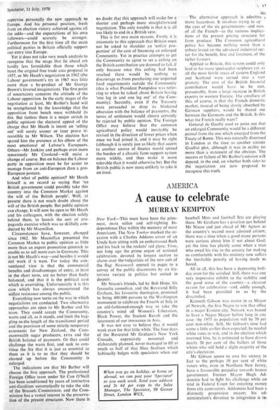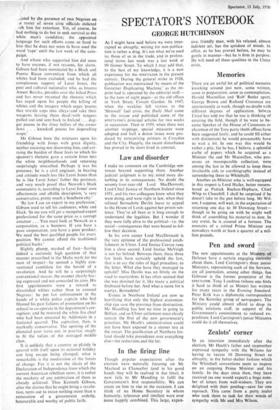AMERICA
A cause to celebrate
MURRAY KEMPTON
New York—This must have been the grim- mest, most sullen and self-righting In- dependence Day within the memory of most Americans. The New Yorker marked the oc- casion with a Charles Addams cover of an Uncle Sam sitting with an embarrassed flush and his back to the rockets' red glare; Time, not long ago the prime organ of national celebration, devoted its longest section to alarm over the-vulgarities of the new cult of the flag; Newsweek opened its pages to a survey of the public discontents by six his- torians variant in politics but united in despair.
Mr Nixon's friends, led by Bob Hope, his favourite comedian, and the Reverend Billy Graham, his favourite theologian, promised to bring 400,000 persons to the Washington monument to celebrate the Fourth of July in an old-fashioned-enough way to take -the country's mind off Women's Liberation, Black Power, the Student Revolt and the interment of our innocence in Asia.
It was not easy to believe that it would work even for that little while. The four days of the Reverend Mr Graham's New York Crusade, expensively mounted and elaborately planned, never managed to fill as much as half of that Shea Stadium which habitually bulges with spectators when our
baseball Mets and football Jets are playing there. Mr Graham has a position just behind Mr Nixon and just ahead of Mr Agnew as the country's second most admired citizen; there was a time when a good many persons were curious about him if not about God; yet the time has plainly come when a man who owed his rise to the anxiety for making us comfortable with his ministry now suffers the inevitable penalty of having made us bored.
All in all, this has been a depressing holi- day even for the satisfied. Still, there was one very impressive exhibit to the stability and the good sense of the country—a clearcut reason for celebration—and, oddly enough, it had been provided to us by the dissatisfied.
Kenneth Gibson was sworn in as Mayor of Newark, the first Negro to win that office in a major Eastern city. Newark was bound to have a Negro Mayor before long in any case—by 1975 its population will be 70 per cent non-white. Still, Mr Gibson's time had come a little earlier than expected; he needed white votes to win, and in the election which crowned him, he is estimated to have drawn nearly 20 per cent of the ballots of those whites who still hold a slight majority of the city's electorate.
Mr Gibson seems to owe his victory in fact to the perhaps 10 per cent of white voters who, even in Northern New Jersey, have a favourable prejudice towards honest government. Former Mayor Hugh Ad- donizio had to fight his challenge while on trial in Federal Court for extorting money from city contractors. Addonizio had been a distinctly progressive mayor; his ad- ministration's devotion to integration is in- ..sated by the presence of two Negroes on x roster of seven civic officials indicted 7ith him for extortion. Yet, of course, he had nothing to do but to seek survival as the white man's candidate; the appointed language for such efforts came so hard to him that he does not seem fo have used the word 'rape' until the last week of the cam- paign.
And whose who supported him did seem to have excuses, if not reasons, for alarm. Gibson had been nominated by a Black and Puerto Rican convention from which all whites had been excluded; and he had the conspicuous support of Leroi Jones, the poet and cultural nationalist who, as lmamu Ameer Baraka, presides over the Jehad Press and has never recanted the rhetoric which has urged upon his people the killing of whites and the imagery which urges 'poems that wrestle cops into alleys/and take their weapons leaving them dead/with tongues pulled out and sent back to Ireland . . . dag- ger poems in the slimy bellies of the owner Jews . . . knockoff poems for dopeselling wops.'
Mr Gibson bore the strictures upon his friendship with Jones with great dignity, neither excusing nor disowning him, and car- rying the burden of those fears to which his sponsor's rhetoric gave a certain form into the white neighbourhoods and returning surprisingly unscathed. Perhaps it was his presence; he is a civil engineer, in bearing and attitude much less like Leroi Jones than he is like Leroi Jones' father the postman, and very much proof that Newark's black community is, according to Leroi Jones' own affectionate and affable description, 'a very conservative, pretty much a Southern city.'
`By law I am an expert in my profession,' Gibson used to tell his audiences, white and black. 'In me you will get a recognised expert professional for the same price as a corrupt amateur . . . You must look at Newark as a corporation, as a business. If you have a poor corporation, you have a poor product. We need the best qualified people for every position. We cannot afford the traditional political hacks.' Slightly plump, masked of face—having indeed a curiously high quotient of that manner prescribed in the Mafia myth for the man of respect—he seemed a highly con- ventional candidate for the herald of a revolution. And he will be a surprisingly conventional mayor, the manner clearly hav- ing expressed and not concealed its aims. His first appointments were a reward to dissatisfied whites rather than to aroused Negroes: he put law enforcement in the hands of a white police captain who had blamed his past failures of promotion on his refusal to co-operate in the department's cor- ruption; and he restored the white fire chief who had been unseated by Addonizio in a factional quarrel. The aspiration, then, is markedly conservative. The uprising of the alienated 'poor turns out, in practice, snugly to fit the values of the outraged middle class.
It is unlikely that a country so plainly in quarrel with itself upon its national holiday can long escape being changed; what is remarkable is the moderation of the forces of change. For it is not the ideals of the Declaration of Independence from which the current American rebellion turns; it is rather the mockery of any celebration of them as already achieved. Thus Kenneth Gibson, after the alarms that he might bring a revolu- tion, turns out to mean nothing more than a restoration of a government orderly, honourable and worthy of public faith.































 Previous page
Previous page